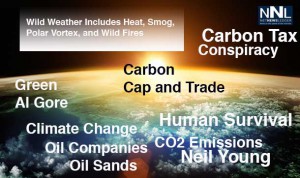 THUNDER BAY – ENVIRONMENT – On Sunday, November 2, 2014 the Intergovernmental Panel on Climate Change (IPCC) summarized the findings of the IPCC Fifth Assessment Reports into a synthesis report for policymakers. R. K. Pachauri, Chair of the IPCC said, “To keep a good chance of staying below 2ºC, and at manageable costs, our emissions should drop by 40 to 70 percent globally between 2010 and 2050, falling to zero or below by 2100. We have that opportunity, and the choice is in our hands. Without additional mitigation efforts beyond those in place today, and even with adaptation, warming by the end of the 21st century will lead to high to very high risk of severe, widespread, and irreversible impacts globally.”
THUNDER BAY – ENVIRONMENT – On Sunday, November 2, 2014 the Intergovernmental Panel on Climate Change (IPCC) summarized the findings of the IPCC Fifth Assessment Reports into a synthesis report for policymakers. R. K. Pachauri, Chair of the IPCC said, “To keep a good chance of staying below 2ºC, and at manageable costs, our emissions should drop by 40 to 70 percent globally between 2010 and 2050, falling to zero or below by 2100. We have that opportunity, and the choice is in our hands. Without additional mitigation efforts beyond those in place today, and even with adaptation, warming by the end of the 21st century will lead to high to very high risk of severe, widespread, and irreversible impacts globally.”
Economic analysis in the IPCC reports found that keeping warming below 2ºC would result in an estimated 0.06% annual reduction in consumption growth. Thus, instead of global consumption growing by 2.3% a year (median estimate), growth would instead be 2.24 % a year. These economic estimates of mitigation costs do not account for the benefits of reduced climate change, nor do they account for the numerous co-benefits associated with human health, livelihoods, and development.
In stark contrast, The Stern Review (2006) found climate change impacts if left unchecked could reduce global GDP by at least 5% per year, and possibly as much as 20% per year. At the World Economic Forum in Davos, Switzerland in January 2013, Lord Stern proclaimed that climate change was “far far worse” than in the 2006 report.
On October 7, 2014, Canada’s Environment Commissioner, Julie Gelfand, expressed her disappointment that Canada is only 7% of the way to meeting its weak greenhouse emission targets in the Copenhagen accord.
The Harper Government has often stated that we need to synchronize our climate and energy policies with the USA. Regulation of the oil and gas sector is the current stated policy of the Harper Government, yet regulations of greenhouse gas emission in the oil and gas sector have not been forthcoming nor is sector-by-sector regulation a market-based policy one would expect from a party on the political right.
Cap and trade is a market-based carbon pricing mechanism that was repeatedly rejected by the American people and the US Congress, most recently in 2010. Thus, a federal policy of cap and trade synchronized with the USA is highly unlikely.
There is a simpler market-based approach: implementing a steadily-rising fee on carbon-based fuels that returns all revenue collected to Canadian households. This type of carbon pricing is called carbon fee and dividend. By including border tariffs on goods from nations that lack an equivalent price on carbon, we provide a strong economic incentive for other nations to follow that lead, including our biggest trading partner, the USA.
Carbon pricing was highlighted in the IPCC Fifth Assessment Report: “The short-run effects of cap and trade systems have been limited as a result of loose caps or caps that have not proved to be constraining (limited evidence, medium agreement). In some countries, tax-based policies specifically aimed at reducing GHG emissions – alongside technology and other policies – have helped to weaken the link between GHG emissions and GDP (high confidence).”
The World Bank reported earlier this year that 73 national governments, 11 regional governments and more than 1,000 businesses and investors support clean energy through pricing carbon pollution. In total, these leaders represent 52 % of global GDP, 54% of global greenhouse gas emissions and almost half the world’s population. Canada, at the national level, is not part of this majority.
Clearly Canada is not doing its part to cut GHG emissions despite the abundant evidence that cutting emissions far outweighs the costs of inaction. Canadians from across the country will be in Ottawa November 22-24, meeting with parliamentarians about which carbon pricing mechanism is best for our nation at Citizens’ Climate Lobby Canada’s second annual conference, entitled Carbon Fee Prosperity. As proud Canadians who are also very concerned about the impacts increasingly unstable weather from carbon emissions will have on future generations and global wealth and prosperity, we hope to see Canada resume its position as a global leader on environmental issues.
Dr Wm M Cameron, MD, FRCPC Kenora
Dr. Sanjiv Mathur, MD, FRCPC Sudbury
Dr Mark Polle, MD, CCFP Red Lake
Kaaren Dannenmann, Trout Lake
Pat Weese, Red Lake
Angela McLaren, Red Lake
Nancy Phillips, Red Lake
Catherine Mochrie, Red Lake
Christine Penner Polle, Red Lake
Valerie Blab, Red Lake
Vaughn Blab, Red Lake
Beth Turner, Kenora
Teika Newton, Kenora
Michelle Shepard, Winnipeg
Catherine Kiewning, Dryden
Tim McKillop, Pickle Lake
Harneet Gill, Sudbury
Mercedez Quinlan, Sudbury
Gerry Labelle, Azilda
Cathy Orlando, Sudbury
Salina Mathur, Sudbury






